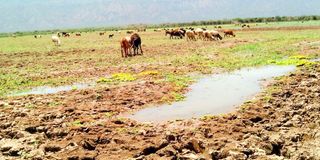Animals perish as dry spell sounds death knell for Lake Kamnarok Game Reserve

Livestock graze in Lake Kamnarok Game Reserve in Kerio Valley, Baringo County in 2019. At least 200 rare white crocodiles at Lake Kamnarok Game Reserve in Kerio Valley have died since January due to the prolonged drought.
At least 200 rare white crocodiles at Lake Kamnarok Game Reserve in Kerio Valley have died since January due to the prolonged drought.
The surviving crocodiles are moving upstream on the lake’s tributaries, raising the spectre of attacks among frightened residents, Park warden James Kibet told Nation yesterday.
“Some of the white crocodiles are stranded in pools of mud while others have been forced to move upstream. We have over 200 that have died since January,” Mr Kibet told Nation.
Wildlife corridors, Mr Kibet said, have been affected by human encroachment.
He noted that, as the water level recedes, locals have invaded the surrounding areas with thousands of their livestock, depleting the vegetation and displacing wildlife.
The warden further said thousands of wild animals such as elephants, baboons, and warthogs have lost their habitats.
Lake Kamnarok was once a major revenue earner for Baringo County, with thousands of tourists flocking to the 87.7 square-kilometre park to view wildlife.
Gazetted as a reserve in 1983, the oxbow lake was once touted as the second-largest ecosystem in Africa with the highest number of animals after Lake Chad.
With over 10,000 white crocodiles, 400 elephants, 13 species of other mammals, and a variety of bird species by 2020, Lake Kamnarok boasted a rich biodiversity.
But, with the water body gradually drying up, the wild animals are fleeing and villagers are fearful of an increase in human-wildlife conflict due to encroachment by the beasts onto farms and homes in search of food and water.
Locals are appealing to the relevant state agencies, such as the Kenya Wildlife Service (KWS), to intervene in the crisis and avert the looming catastrophe.
“Most of the crocodiles are dying because of hunger and thirst. KWS can truck water to wildlife inside the park. Crocodiles are straying into people’s homes looking for water and we are living in constant fear of attacks and deaths,” said Mr Joseph Bowen in Kapluk village.
Dropped drastically
Locals say all was well until 2010 when the water levels in the lake dropped drastically.
In 2015, the county government in conjunction with KWS pumped more than Sh40 million in a bid to rejuvenate it.
The devolved unit further spent Sh1.2 million in 2019 to remove water hyacinths that had invaded the lake.
North Rift Economic Bloc wildlife advisor William Kimosop said a majority of the rivers in the region have dried up, spelling doom for the lake.





